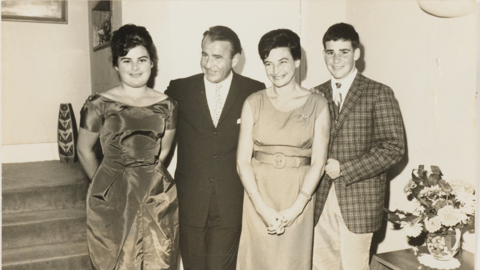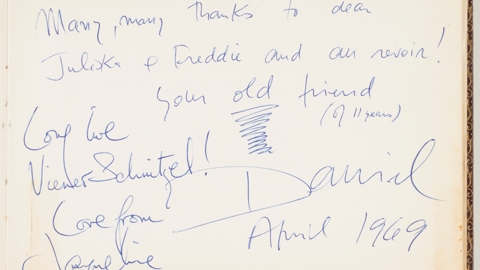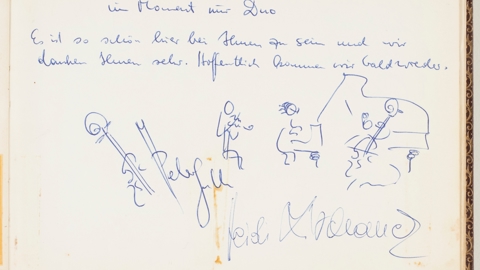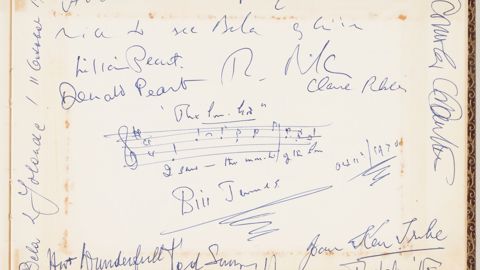In 1969 in leafy Wahroonga, Fred and Julie Wenkart were preparing for a very special dinner. Their guest was Daniel Barenboim, the acclaimed Argentinian-Israeli pianist and conductor in Australia to conduct and perform with the English Chamber Orchestra. Travelling with him was the legendary British cellist Jacqueline du Pré, whom he had married just two years earlier.
‘Long live Wiener Schnitzel! Love from Jacqueline’
Their visit in April 1969 is recorded in the Wenkarts’ guest book. And from du Pré’s effusive message in the book — ‘Long live Wiener Schnitzel! Love from Jacqueline’ — we know what was on the menu.
The Wenkart guest books are now preserved in the State Library of NSW, and in 2023 they were digitised with funding from the Wenkart Foundation. The books shed light on the post–World War II flourishing of classical music, in particular chamber music, in Australia, which was nurtured by European refugees who chose to rebuild their lives in this country. Through Musica Viva Australia’s advocacy and the Wenkarts’ hospitality, Australian audiences experienced international music-making of the highest order, and Australian artists were able to benchmark their own work against the best in the world.
The Wenkart’s story is an all-too familiar one for ‘new Australians’ of their time. Alfred (Fred) Wenkart married Juliska (Julie) in Vienna in 1937. After the annexation of Austria by Nazi Germany in March 1938, the Wenkarts fled Austria in July for Hungary, where Juliska’s family lived. They arrived in Sydney on the Remo in May 1939. The couple opened a clothing factory in Hornsby, the suburb’s first manufacturing company. Their daughter, Susan, was born in 1942 and their son, Thomas, was born in 1944. They bought their home on Grosvenor Street in Wahroonga in 1946.
Over the next four and a half decades, the Wenkart’s home became a gathering place not only for cultural activities but also for the wider community of postwar European immigrants and visitors. In addition to musical events, the Kleines Wiener Theater (Little Viennese Theatre), the Independent Theatre, numerous charities and even cricket and soccer clubs made use of the Wenkart house and its expansive grounds. All this was recorded in the Wenkart guest books from 1952 to 1998, which the family donated to the Library in 2023.
When you flip through the books, the handwritten names of renowned musicians leap off the pages
Pianist Alfred Brendel (Austria), soprano Lucia Popp (Slovakia), violinist Béla Dekany (Hungary), conductors Antal Doráti (Hungary/USA) and Nicolai Malko (Russia/USA), and ensembles such as the Alma Trio, Smetana Quartet, Bartok String Quartet and Vienna Trio, to name just a few.
Entries conjure up colourful memories. For instance, in August 1952 more than 80 guests gathered there for a farewell party and musicale for Austrian pianist Paul Badura-Skoda, among them Eugene Goossens (then chief conductor of the Sydney Symphony Orchestra), William G James (composer), Laurence Godfrey Smith (pianist) and the Austrian Consul, Dr R Lind. An outdoor fireplace warmed guests as they danced on the paved terrace. Badura-Skoda himself returned and signed the guest books again in 1956, 1978 — when he wrote, ‘What a beautiful reunion here, twenty two years after my last visit here! To Fred and Juliska, my wonderful hosts then and now in friendship and affection’ — and 1982.
The home at Grosvenor Street was also a place to showcase local talent. Like Fred and Julie Wenkart, some were Jewish refugees from Hitler’s Europe who had settled in Australia. They included Robert Pikler (Hungarian-born violist), Werner Baer (German-born pianist, composer and broadcaster) and Theo Salzman (Austrian-born cellist). Other musicians who signed the guest books were born here, such as Ernest Llewellyn (violist), Donald Hazelwood (violinist), Anne Menzies (clarinettist), Charmian Gadd (violinist), Ronald Cragg (violist), Romola Costantino (pianist), Yvonne Kenny (soprano), Nathan Wax (cellist) and jazz musicians Don Burrows and John Sangster. Additionally, the Wahroonga District Music Club held many Christmas parties and recitals with up to 200 guests at the Wenkart home.
The story of Musica Viva Australia’s early years is woven throughout the guest book. From the mid-1950s, the Wenkarts’ home was a venue for numerous recitals and garden parties for the organisation. Here chamber music was presented in its truest sense and setting — in the home, as the word ‘chamber’ originally implied. Goldner’s appreciation is evident from his entry in 1980:
'To my oldest Australian friends and original Musica Viva enthusiasts and helpers and most gracious hosts to all the visiting artists.'
There were numerous meetings and parties on behalf of the Musica Viva Members’ Committee, including a 40th Birthday Gala Concert in 1985 presented by the Hazelwood Trio. The following year, an afternoon of chamber music was held to honour Ken Tribe AO, Musica Viva Australia’s retiring Chairman, with music provided by the Sydney String Quartet.
A tragic story is also revealed within the guest books. There is a card from Regina Ridge thanking the Wenkarts for hosting her farewell party in August 1975 after 25 years as Musica Viva’s General Manager. Pasted next to her card is a newspaper cutting reporting her death two months later, after being hit by a car while on holiday in Prague. She had been visiting members of the Smetana Quartet for their 30th anniversary as an ensemble.
The State Library of NSW has been collecting Musica Viva Australia’s administrative records since 1975 — 700 boxes deposited in 16 consignments! The records include correspondence with touring Australian and international ensembles, promotional photographs, programs, and sound and video recordings relating to the Musica Viva in Schools program and other performances of Australian chamber ensembles.
In 2023, the archives of Musica Viva Australia were added to the UNESCO Australian Memory of the World Register — part of the UNESCO program to preserve the world’s documentary heritage — in recognition of their significant cultural value.
Meredith Lawn is Music Archivist and Specialist Librarian in Cataloguing and Collection Services. This story was first published in Openbook, the magazine of the State Library of NSW.
The Wenkart family guest books were digitised with funding from the Wenkart Foundation and can be viewed in the Library’s online catalogue. The Library’s Musica Viva Australia collection received cataloguing and preservation work in 2023 through the support of the Library Foundation.
This is part of Untold Stories, a series of features about the people behind the music at Musica Viva Australia. Play your part in the future story of Musica Viva Australia by making a gift in our 80th anniversary year. To discuss making a gift, please contact Zoe Cobden-Jewitt, zcobden-jewitt@musicaviva.com.au




